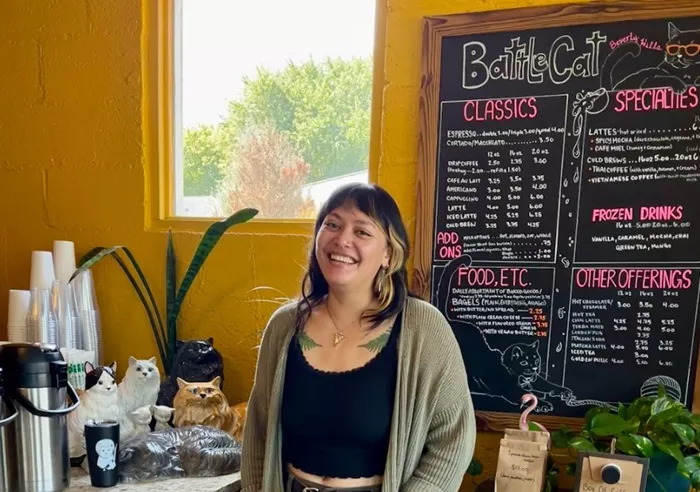Hayley Lusk, the manager of Battle Cat Coffee’s East Asheville location, has navigated an unexpected yet fulfilling career path since her student days at the University of North Carolina at Asheville (UNCA). Initially pursuing a degree in Drama, Lusk’s trajectory shifted dramatically when she discovered her passion for trade work through technical courses, leading her to establish a successful coffee shop that embodies community spirit and quality.
Reflecting on her time at UNCA, Lusk shared, “My two years at UNCA had a profound impact on how I viewed myself in the workforce and what I wanted out of life.” Originally enrolled with aspirations of becoming a drama major, she found that the realities of university life left her feeling more confused than ever. “Like many ‘dropouts,’ I started my career in food and beverage,” she recounted, highlighting the often overlooked transition many students face when their initial academic paths diverge from their interests.
Lusk credits her technical drama classes for reshaping her perspective on career options. “Before, I had only considered a four-year university track. Growing up in a rural area, I wanted to break negative stereotypes about trade careers,” she explained. “The class opened doors I hadn’t considered.” This revelation propelled her toward a broader exploration of her potential, encouraging her to examine various disciplines and pursue her education in a more relaxed and practical setting.
Her liberal arts education not only expanded her horizons but also allowed her to cultivate relationships with influential mentors. Lusk fondly recalls a technical drama instructor whose engaging teaching style left a lasting impression, describing him as a “mad scientist.” Another key figure in her academic journey was Brent Skidmore, a sculpture professor who later became a customer at Battle Cat, illustrating the enduring connections forged during her time at university.
At Battle Cat Coffee, Lusk has worked diligently to cultivate a welcoming atmosphere, drawing attention to the differences in coffee culture over the years. “When I was a teenager, most shops were focused on second-wave coffee, emphasizing basic espresso drinks,” she noted. “Now, we’re in the third wave, where the origin and processing of beans matter,” likening the evolution of coffee culture to that of the wine industry. This shift reflects a growing appreciation among consumers for the intricacies of coffee production, from farm to cup.
The East Asheville location of Battle Cat is still on the rise in popularity, while the West Asheville shop has established itself as a community favorite. “The brand centers on quality, value, and a welcoming vibe,” Lusk explained. “Our baristas are personable and remember regulars’ names and orders, creating a sense of community.” This focus on connection resonates with customers, positioning Battle Cat as more than just a coffee shop; it serves as a gathering place for locals.
Lusk likens Battle Cat to the iconic bar from the television show Cheers, emphasizing her commitment to fostering community ties. “We’re like the ‘Cheers’ of coffee shops, where everybody knows your name. I strive to create a special atmosphere, encapsulated by my catchphrase: ‘community through coffee.’” This philosophy underpins the daily operations of the café, as Lusk and her team work to ensure each customer feels valued and welcomed.
To thrive in Asheville’s competitive coffee market, Lusk has turned to social media as a crucial tool for engagement. “Creating a dialogue through platforms like Instagram has given us a personal voice, reinforcing our shop’s vibe,” she explained. This strategy not only allows Battle Cat to reach a wider audience but also fosters a sense of authenticity and connection with its clientele.
For those looking to embark on their own coffee entrepreneurial journeys, Lusk offers valuable insights drawn from her experiences. “Start with a manageable menu and focus on quality. Research your market and build relationships with your customers,” she advises. “Expect a challenging first year; word of mouth is the best marketing tool.” Her candid acknowledgment of the challenges faced by new businesses reflects a realistic understanding of entrepreneurship, underscoring the importance of resilience and adaptability.
Now a key figure in the local coffee scene, Lusk has successfully cultivated an environment that marries quality coffee with genuine customer connections. Her journey, from a drama major uncertain about her future to the manager of a thriving coffee shop, exemplifies the transformative power of education and community engagement. As Battle Cat Coffee continues to grow, Lusk remains committed to her vision of fostering connection and quality, making her establishment a beloved cornerstone of the East Asheville community.
In conclusion, Hayley Lusk’s story is one of adaptability and passion, illustrating how a detour from the expected path can lead to fulfilling outcomes. Through her leadership at Battle Cat Coffee, she not only serves exceptional coffee but also builds a strong sense of community, embodying the spirit of local entrepreneurship. As she looks to the future, Lusk’s dedication to her craft and her customers will undoubtedly shape the continued success of Battle Cat Coffee, making it a beacon of community connection in Asheville.
Related Topics:
Soar Above Tad Fane: Coffee and Ziplining in Laos
Sip Local, Boycott Global: CCNY’s Fight for Ethical Coffee Choices
Coffee with a Cause: Dhuwa’s Journey to Woolworths


